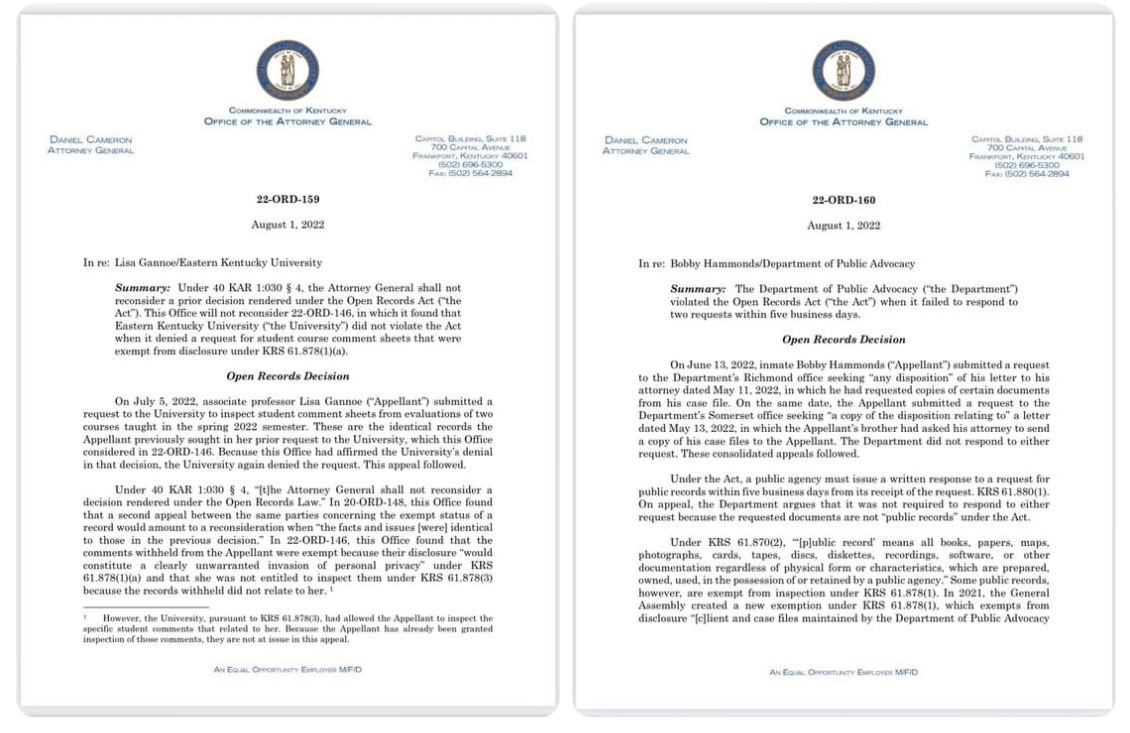
There are two valuable lessons — one for the public and one for public agencies — to be learned from open records decisions issued by the Office of the Kentucky Attorney General last week.
The first: Don’t spin your wheels seeking the Office’s reconsideration of an open records decision with which you disagree.
In 22-ORD-159, the Attorney General declined to reconsider 22-ORD-146, determining that Eastern Kentucky University did not violate the Act when it denied a request for student course comment sheets that were exempt from disclosure under KRS 61.878(1)(a).
https://ag.ky.gov/Resources/orom/2022/22-ORD-159.pdf
In 1995, the General Assembly promulgated 40 KAR 1:030 § 4, an administrative regulation stating that the Attorney General shall not reconsider a prior decision rendered under the Open Records Act.
https://apps.legislature.ky.gov/law/kar/titles/040/001/030/
Either party to the appeal — requester or public agency — who is dissatisfied with a decision may appeal the decision to circuit court as provided in KRS 61.880(5), a challenge to the Attorney General’s open records decision must be pursued in the courts.
A party’s request for reconsideration of an Attorney General’s open records decision is an exercise in futility.
The second: A statutory carve out for a particular set of a particular agency’s records does not relieve the agency of the duty to respond to an open records request within five business days and to explain the statutory basis for denying the request.
In 2021, the General Assembly enacted a new exception to the open records law for client or case files maintained by the Department of Public Advocacy or any entity contracting with the Department of Public Advocacy for the purpose of legal representation.
https://apps.legislature.ky.gov/recorddocuments/bill/21RS/hb312/bill.pdf
In essence, the General Assembly leveled the playing field by extending permanent protection from open records requests for public defender case files at KRS 61.878(1)(p) that it had recognized for “records or information compiled and maintained by county attorneys or Commonwealth's attorneys pertaining to criminal investigations or criminal litigation” at KRS 61.878(1)(h) in the early 90s.
https://apps.legislature.ky.gov/law/statutes/statute.aspx?id=51393
In both cases, lawmakers established particularized exceptions for a narrow set of records in a specific type of public agency, but did •not• relieve the public agency of its duty to produce other public records of the agency — e.g., payroll records, financial and operational records, personnel records — or of its duty to comply with the requirements of KRS 61.880(1) by issuing a written response to the requester, within five business days, that “includes a statement of the specific exception authorizing the withholding of the record and a brief explanation of how the exception applies to the record withheld.”
https://apps.legislature.ky.gov/law/statutes/statute.aspx?id=51394
In 22-ORD-160, the Office of the Attorney General determined that the Department of Public Advocacy violated the Open Records Act when it failed to respond to an inmate’s request for “‘any disposition’ of his letter to his attorney dated May 11, 2022, in which he had requested copies of certain documents from his case file.”
https://ag.ky.gov/Resources/orom/2022/22-ORD-160.pdf
Certainly, there have been multiple open records decisions holding that Commonwealth’s or County Attorneys violated the open records law by failing to respond to a request for criminal litigation files, as well as other nonexempt records of their offices, based on the permanent exception found at KRS 61.878(1)(h).
See, e.g., https://ag.ky.gov/Resources/orom/2005/05ORD140.doc
They, like the Department of Public Advocacy, made the mistake of treating the narrow exception as blanket absolution from open records compliance.
Both exceptions authorize nondisclosure of the specific records. Neither is a license to ignore all other duties associated with the open records law.


